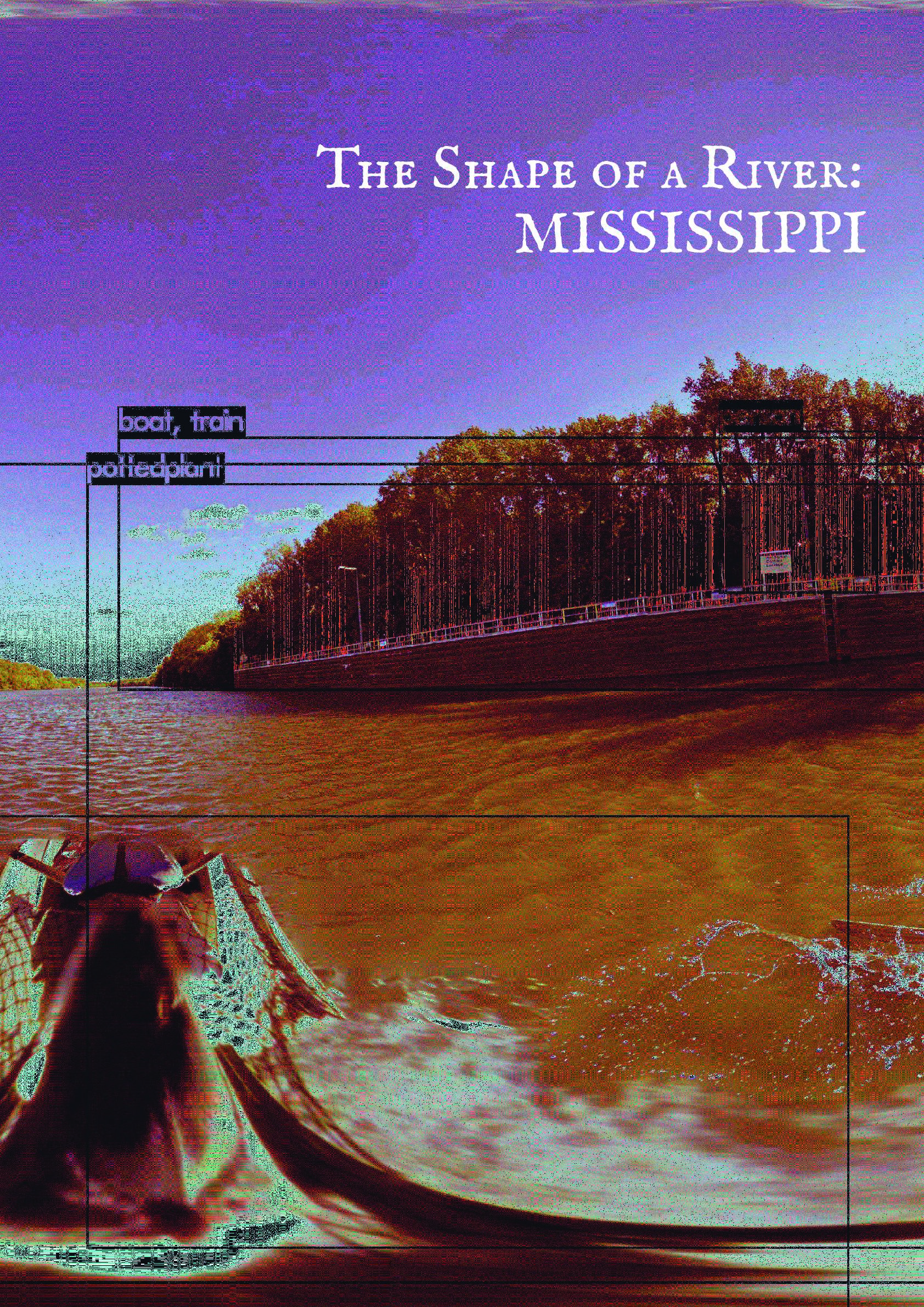The Shape of a River: Mississippi
Building on six artistic and scientific case studies from the Mississippi. An Anthropocene River project, students from the University of Applied Sciences, Potsdam, documented the processes and visualizations explored in their related seminar, The Shape of a River: Mississippi, held during the winter of 2020/21.
Students analyzed case studies on the Mississippi, developed their own questions, exchanged with the case study authors, and designed new maps of relationships. The work considered questions such as, what approaches and methods were used for these case studies? Which relationships between human and non-human actors could be observed? What socio-political relationships become visible through the river? Who is being overlooked? What does this have to do with us here? And: how can we make these relationships visible?
This downloadable publication documents much of the process and results from this journey, which was undertaken mainly in Berlin and Potsdam, but also online during the COVID-19 pandemic—far from the Mississippi River.
For further exploration, visit The New Mississippi River Basin Mythology—an online journey developed by students Kerstin Humm, Tilmann Finner, and Marielouis Hippler.


- contributionSarah Lewison, Lynn Peemoeller, Andrew Yang
Encountering Para-Human Species
Non-human species sometimes mediate societal processes of marginalization, but they can also play a role in solidarity. What might we learn from other species?
Communicating, Human-animal relations, Affect, Agriculture, Biodiversity
- contributionSarah Lewison, Swan Parsons, Florian Ruland, Alexandra Toland, Andrew Yang
On the Recuperative Mismanagement of a Cosmopolitan Fish
Closing the opening week of The Shape of a Practice, this meal-at-a-distance brought speakers to the transatlantic kitchen table along with so-called invasive species from the US and Germany.
Storytelling, Conversation, Experiment, History, Ecology, Species
- contributionKayla Anderson, Sara Black, Amber Ginsburg, Sarah Lewison, Claire Pentecost
Inheritance 2.0
A guided meditation that invites us to journey deep into the earth and back in time.
Field Study, Sensing
- Case StudyJeremy Bolen, Brian Holmes
Hourglass River
Mapping, Environmental Justice, Engineering, Disaster, Erosion, Sedimentation, Water, Flood, Complexity, Infrastructure, Future
- contributionJennifer Colten, Ryan Griffis, Sarah Kanouse
In a Landscape, Over Time
Far from belonging to a dated genre, landscapes can prompt artists to engage with the embodied, experiential and political qualities of space.
Conversation, Field Work, Landscape, Environmental Justice
- projectSarah Kanouse
Beyond Property
Exploring the evolution of the “ownership model” of property as a technology of the colonial Anthropocene and considering alternative possibilities.
Field Work, Settler Colonialism, Human-environment relations
- contributionNicholas Brown, Ryan Griffis, Sarah Kanouse
Blackhawk Park Is Indigenous Land (Beyond Acknowledgment)
How does the legacy of settler colonialism affect and seep into the present? A reflection at Blackhawk Park.
Reflection, Settler Colonialism, Indigenous Rights, Violence, Agency
- projectRyan Griffis
After Extraction
Combining creative nonfiction, montage-based images, and intuitive exercises to depict a partial history of extractive land use in Central Illinois.
Field Work, Settler Colonialism, Landscape
- contributionIsabelle Carbonell
The Mississippi Multiverse
Mississippi Multiverse is an immersive film that starts from an embodied sensorial practice to reckon with the ecological impact of petrochemical industries along the river.
Film, Extraction, Human-environment relations, Water, Pollution, Ecology, Embodiment, Embodied research
- contributionIsabelle Carbonell
The River in 24/7
What is the sound of the Lower Mississippi, a “superhighway” through which huge proportions of exported goods from the US are shipped every day?
Sound, Infrastructure, Water, Pollution, Human-environment relations, Ecology, Metabolism
- Case StudyJohn Kim
From Emergency to Emergence
A series of conversations and workshops on mutual aid, solidarity, and municipalism involving activists from Minneapolis and Saint Paul.
Case Study, Engagement, Environmental Justice, Urbanism, Equality, Violence, Community
- contributionJohn Kim, Abbéy Odunlami
Collaborative Social Formats
To what end should activism and institutionally backed projects cooperate? Contributors Kim and Odunlami recap on their experiences in the years 2019 and 2020.
Consensus Building, Conversation, Engagement, Race, Environmental Justice, Inequality
- contributionDerek Hoeferlin, Monique Verdin
Mapping (In-)visibilities and Entanglements
How might critical artistic mapping reveal the relations of power that dominate a region?
Conversation, Mapping, Architecture, Infrastructure, Representation
Credits
Case study authors: Andrew S. Yang, Sarah Lewison, Brian Holmes, Sarah Kanouse, Ryan Griffis, Isabelle Carbonell, John Kim and Derek Hoeferlin.
HKW: Neli Wagner, Anna Chwialkowska and Pia Lohmann.
Myriel Milićević with the students of Design and European Media Studies at the University of Applied Sciences Potsdam (FHP): Kerstin Humm, Tilmann Finner, Marielouis Hippler, Dilara Schneider, Philipp Buhlmann, Maria Giannisi, Lydia Prien, Huy Hoang Nguyen, Viktoria Laudenbach, Laura Link, Florica Gay, Sophia von Wassenberg, Anika Halbach, Franka Sühlo and Vanessa Pattri.
